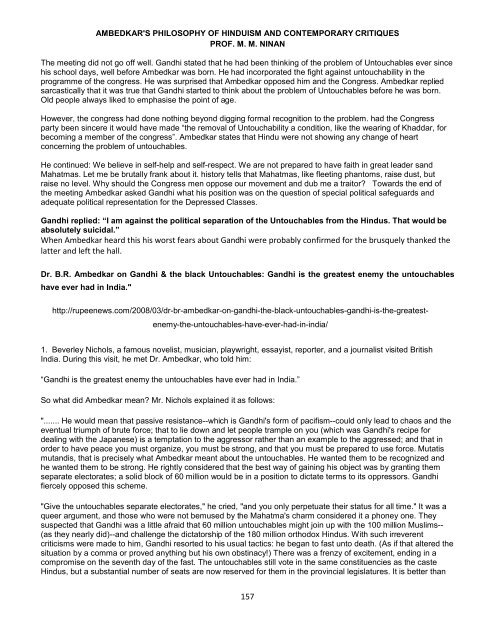Ambedkar-Philosophy of Hinduism
Create successful ePaper yourself
Turn your PDF publications into a flip-book with our unique Google optimized e-Paper software.
AMBEDKAR'S PHILOSOPHY OF HINDUISM AND CONTEMPORARY CRITIQUES<br />
PROF. M. M. NINAN<br />
The meeting did not go <strong>of</strong>f well. Gandhi stated that he had been thinking <strong>of</strong> the problem <strong>of</strong> Untouchables ever since<br />
his school days, well before <strong>Ambedkar</strong> was born. He had incorporated the fight against untouchability in the<br />
programme <strong>of</strong> the congress. He was surprised that <strong>Ambedkar</strong> opposed him and the Congress. <strong>Ambedkar</strong> replied<br />
sarcastically that it was true that Gandhi started to think about the problem <strong>of</strong> Untouchables before he was born.<br />
Old people always liked to emphasise the point <strong>of</strong> age.<br />
However, the congress had done nothing beyond digging formal recognition to the problem. had the Congress<br />
party been sincere it would have made “the removal <strong>of</strong> Untouchability a condition, like the wearing <strong>of</strong> Khaddar, for<br />
becoming a member <strong>of</strong> the congress”. <strong>Ambedkar</strong> states that Hindu were not showing any change <strong>of</strong> heart<br />
concerning the problem <strong>of</strong> untouchables.<br />
He continued: We believe in self-help and self-respect. We are not prepared to have faith in great leader sand<br />
Mahatmas. Let me be brutally frank about it. history tells that Mahatmas, like fleeting phantoms, raise dust, but<br />
raise no level. Why should the Congress men oppose our movement and dub me a traitor? Towards the end <strong>of</strong><br />
the meeting <strong>Ambedkar</strong> asked Gandhi what his position was on the question <strong>of</strong> special political safeguards and<br />
adequate political representation for the Depressed Classes.<br />
Gandhi replied: “I am against the political separation <strong>of</strong> the Untouchables from the Hindus. That would be<br />
absolutely suicidal.”<br />
When <strong>Ambedkar</strong> heard this his worst fears about Gandhi were probably confirmed for the brusquely thanked the<br />
latter and left the hall.<br />
Dr. B.R. <strong>Ambedkar</strong> on Gandhi & the black Untouchables: Gandhi is the greatest enemy the untouchables<br />
have ever had in India."<br />
http://rupeenews.com/2008/03/dr-br-ambedkar-on-gandhi-the-black-untouchables-gandhi-is-the-greatestenemy-the-untouchables-have-ever-had-in-india/<br />
1. Beverley Nichols, a famous novelist, musician, playwright, essayist, reporter, and a journalist visited British<br />
India. During this visit, he met Dr. <strong>Ambedkar</strong>, who told him:<br />
“Gandhi is the greatest enemy the untouchables have ever had in India.”<br />
So what did <strong>Ambedkar</strong> mean? Mr. Nichols explained it as follows:<br />
"....... He would mean that passive resistance--which is Gandhi's form <strong>of</strong> pacifism--could only lead to chaos and the<br />
eventual triumph <strong>of</strong> brute force; that to lie down and let people trample on you (which was Gandhi's recipe for<br />
dealing with the Japanese) is a temptation to the aggressor rather than an example to the aggressed; and that in<br />
order to have peace you must organize, you must be strong, and that you must be prepared to use force. Mutatis<br />
mutandis, that is precisely what <strong>Ambedkar</strong> meant about the untouchables. He wanted them to be recognized and<br />
he wanted them to be strong. He rightly considered that the best way <strong>of</strong> gaining his object was by granting them<br />
separate electorates; a solid block <strong>of</strong> 60 million would be in a position to dictate terms to its oppressors. Gandhi<br />
fiercely opposed this scheme.<br />
"Give the untouchables separate electorates," he cried, "and you only perpetuate their status for all time." It was a<br />
queer argument, and those who were not bemused by the Mahatma's charm considered it a phoney one. They<br />
suspected that Gandhi was a little afraid that 60 million untouchables might join up with the 100 million Muslims--<br />
(as they nearly did)--and challenge the dictatorship <strong>of</strong> the 180 million orthodox Hindus. With such irreverent<br />
criticisms were made to him, Gandhi resorted to his usual tactics: he began to fast unto death. (As if that altered the<br />
situation by a comma or proved anything but his own obstinacy!) There was a frenzy <strong>of</strong> excitement, ending in a<br />
compromise on the seventh day <strong>of</strong> the fast. The untouchables still vote in the same constituencies as the caste<br />
Hindus, but a substantial number <strong>of</strong> seats are now reserved for them in the provincial legislatures. It is better than<br />
157


















